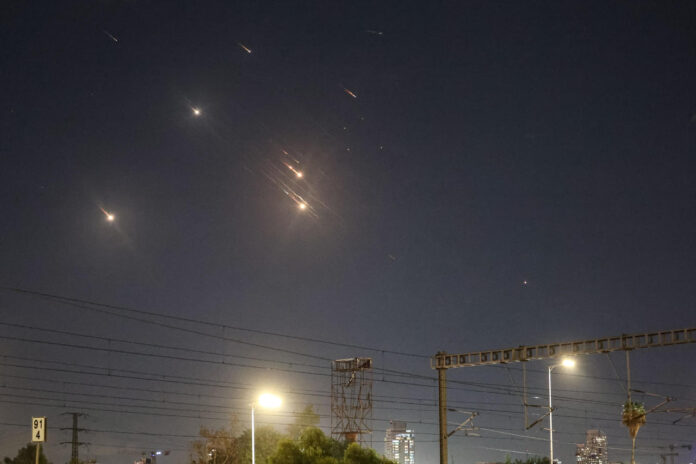Iran-backed Iraqi militias have issued a stern warning to the United States, stating that if the U.S. engages in any hostile actions against Iran, American interests throughout the region will be under threat. The warning was delivered by a group calling itself the Coordination Committee for the Iraqi Resistance, a coalition of Iranian-supported militias operating in Iraq.
Intense Missile Clash: Iran Fires 180 Missiles at Israel
In their statement, the militias made it clear that any involvement by the U.S. in military actions against Iran would lead to a significant escalation in the region. They emphasized that all American bases and interests, particularly in Iraq, would become immediate targets if the U.S. participated in or supported any offensive actions against Iran.
The militias also directed a warning toward Israel, cautioning against using Iraqi airspace for any retaliatory strikes on Iran. This warning came in the wake of a missile barrage fired at Israel, further intensifying concerns about regional instability. The Coordination Committee explicitly mentioned that if Israel used Iraqi airspace for strikes against Iran, it would result in the targeting of American military installations, not only in Iraq but across the Middle East.
Regular Targeting of U.S. Forces
This latest warning is part of a broader pattern of actions and statements by the Iranian-backed militias in Iraq. These groups have regularly targeted U.S. military bases and installations in both Iraq and Syria, often utilizing drones. The militias claim these attacks are retaliatory measures against U.S. support for Israel, particularly in light of ongoing conflicts involving Israel, Hamas in Gaza, and Hezbollah in Lebanon.
The militias have been vocal in their opposition to the U.S. presence in Iraq and have consistently called for the withdrawal of American forces from the region. Their drone attacks, which have become a regular occurrence, are often framed as a response to Washington’s continued military assistance to Israel, which has been heavily involved in operations in Gaza against Hamas and in countering Hezbollah’s activities in Lebanon.
Iran’s APT-42 Hit with US Sanctions for Meddling with Trump’s Election Campaign
Iran’s Influence in the Region
Iran has long used its influence over Iraqi militias to assert its position in the broader Middle East. The Coordination Committee for the Iraqi Resistance is part of a larger network of militias that receive backing from Tehran, including training, weapons, and financial support. These militias, in turn, act as a proxy force for Iran, allowing it to exert pressure on the U.S. and its allies without engaging in direct military confrontations.
By issuing this warning, the Iraqi militias are signaling their readiness to escalate the conflict if they perceive any threat to Iran. They have positioned themselves as part of a regional resistance front that includes groups like Hezbollah, and their actions are often in direct response to U.S. policies and military strategies in the region.
Defiance Amidst Discord: The Axis of Resistance and the Israel-Iran Conflict
Escalating Tensions
The situation in the Middle East has grown increasingly volatile, with multiple fronts of conflict, including the Israeli-Hamas war and rising tensions between Iran and the U.S. Tehran’s allies, including the militias in Iraq, have stepped up their rhetoric and actions, targeting U.S. forces in what they describe as defensive operations in support of Iran and its regional interests.
This latest statement from the Coordination Committee underscores the interconnectedness of these various conflicts, as actions taken by one party often provoke a chain reaction across the region. For the U.S., this poses a significant challenge, as its military presence in Iraq and Syria remains vulnerable to attacks from these militias, particularly as tensions with Iran continue to mount.
The militias’ focus on American bases in Iraq is of particular concern, given the strategic importance of these installations for U.S. operations in the region. Any escalation of attacks on these bases could not only jeopardize American personnel but also complicate the U.S.’s broader efforts to maintain stability in Iraq and counter terrorism in the region.
As the conflict continues to unfold, the U.S. will need to carefully navigate its role in the region, balancing its support for Israel with the growing threats from Iranian-backed militias. The potential for a broader regional conflict remains high, particularly if these militias make good on their threats to target American interests in response to any perceived U.S. aggression against Iran.


